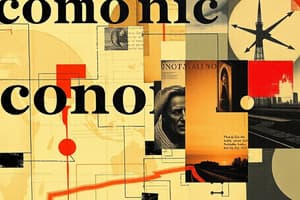Podcast
Questions and Answers
What is the basic economic problem?
What is the basic economic problem?
The gap between scarce resources and the unlimited wants for them.
Define a market economy.
Define a market economy.
The forces of supply and demand allocate resources via the price mechanism. All resources are privately owned and there is no government intervention.
What characterizes a planned economy?
What characterizes a planned economy?
The government allocates all resources via the price mechanism. All resources are owned by the government and they control prices.
What is a mixed economy?
What is a mixed economy?
What is the public sector?
What is the public sector?
Define the private sector.
Define the private sector.
What are factors of production?
What are factors of production?
What does 'capital' refer to in economics?
What does 'capital' refer to in economics?
Define 'enterprise' in an economic context.
Define 'enterprise' in an economic context.
What does 'labour' mean in economics?
What does 'labour' mean in economics?
What is 'land' in economic terms?
What is 'land' in economic terms?
What is opportunity cost?
What is opportunity cost?
Define economic sustainability.
Define economic sustainability.
What is social sustainability?
What is social sustainability?
What does environmental sustainability entail?
What does environmental sustainability entail?
What is the primary sector in economics?
What is the primary sector in economics?
Define the secondary sector.
Define the secondary sector.
What is the tertiary sector?
What is the tertiary sector?
What is a market?
What is a market?
Define factor market.
Define factor market.
What is a product market?
What is a product market?
What is derived demand?
What is derived demand?
Define specialisation in economics.
Define specialisation in economics.
What is division of labour?
What is division of labour?
What is a surplus?
What is a surplus?
Define absolute advantage.
Define absolute advantage.
What is demand in economics?
What is demand in economics?
Define supply.
Define supply.
What is equilibrium (market clearing price)?
What is equilibrium (market clearing price)?
What is consumer sovereignty?
What is consumer sovereignty?
Define price.
Define price.
What is cost in economics?
What is cost in economics?
What does worth mean?
What does worth mean?
What is price elasticity of demand (PED)?
What is price elasticity of demand (PED)?
Define price elasticity of supply (PES).
Define price elasticity of supply (PES).
What is a competitive market?
What is a competitive market?
Define barriers to entry.
Define barriers to entry.
What is market share?
What is market share?
What is a monopoly (pure monopoly)?
What is a monopoly (pure monopoly)?
What does monopoly power (legal monopoly) mean?
What does monopoly power (legal monopoly) mean?
Define statutory monopoly.
Define statutory monopoly.
What is an oligopoly?
What is an oligopoly?
Define duopoly.
Define duopoly.
What is production?
What is production?
What is productivity?
What is productivity?
Define capital intensive.
Define capital intensive.
What are fixed costs?
What are fixed costs?
What are variable costs?
What are variable costs?
What are economies of scale?
What are economies of scale?
What does diseconomies of scale refer to?
What does diseconomies of scale refer to?
What are internal economies of scale?
What are internal economies of scale?
Define external economies of scale.
Define external economies of scale.
What is internal (organic) growth?
What is internal (organic) growth?
What does external (inorganic) growth mean?
What does external (inorganic) growth mean?
Define merger.
Define merger.
What is a takeover (acquisition)?
What is a takeover (acquisition)?
What does backward vertical integration mean?
What does backward vertical integration mean?
Define forward vertical integration.
Define forward vertical integration.
What is horizontal integration?
What is horizontal integration?
Define conglomerate integration.
Define conglomerate integration.
What is collective bargaining?
What is collective bargaining?
Define wage.
Define wage.
What is a salary?
What is a salary?
What is gross pay?
What is gross pay?
Define net pay.
Define net pay.
What is nominal income?
What is nominal income?
What does real income mean?
What does real income mean?
What does the labour market refer to?
What does the labour market refer to?
What is the demand for labour?
What is the demand for labour?
Define supply of labour.
Define supply of labour.
What does elasticity of labour supply mean?
What does elasticity of labour supply mean?
What are efficiency wages?
What are efficiency wages?
What is a minimum wage?
What is a minimum wage?
Define medium of exchange.
Define medium of exchange.
What is money?
What is money?
What does bartering refer to?
What does bartering refer to?
What is an interest rate?
What is an interest rate?
Flashcards are hidden until you start studying
Study Notes
Basic Concepts of Economics
- Basic Economic Problem: The disconnect between limited resources and unlimited wants.
- Market Economy: Resources are allocated through supply and demand with no government intervention; privately owned resources.
- Planned Economy: Governed allocation of resources; all resources owned by the state with controlled prices.
- Mixed Economy: Combination of private and government ownership/management of resources.
Economic Sectors
- Public Sector: Government-owned organizations and entities providing goods and services.
- Private Sector: Firms owned by individuals/groups aimed at profit maximization.
- Primary Sector: Involves direct extraction or use of natural resources.
- Secondary Sector: Involves manufacturing and construction, converting raw materials into goods.
- Tertiary Sector: Focuses on service provision.
Production and Resources
- Factors of Production: Basic resources needed for production, including land, labor, capital, and enterprise.
- Land: Encompasses physical land and all natural resources.
- Labor: Human effort and input in production.
- Capital: Tools and machinery used to produce goods/services.
- Enterprise: The initiative to start businesses, involving risk and potential profit.
Economic Concepts
- Opportunity Cost: The value of the next best alternative forgone when a choice is made.
- Sustainability: Measures economic choices' long-term impact economically, socially, and environmentally.
Market Dynamics
- Demand: Quantity of goods/services consumers are willing to purchase at different prices.
- Supply: Quantity of goods/services producers are able to offer at varying prices.
- Equilibrium: The point where the quantity demanded equals the quantity supplied.
- Consumer Sovereignty: Consumers' preferences influence producers' resource allocation.
Pricing and Costs
- Price Elasticity of Demand (PED): Responsiveness of quantity demanded to changes in price.
- Price Elasticity of Supply (PES): Responsiveness of quantity supplied to price changes.
- Fixed Costs: Costs that remain constant regardless of output levels.
- Variable Costs: Costs that vary with production output.
Market Structure
- Competitive Market: Characterized by many buyers and sellers.
- Monopoly: A single producer or seller dominates the market.
- Oligopoly: Few large firms control a majority of the market share.
- Duopoly: Market dominated by two suppliers.
Business Growth and Integration
- Internal Growth: Expansion through increased sales of existing products/services.
- External Growth: Expansion via mergers or acquisitions.
- Merger: Agreement between businesses to join, retaining original identities.
- Takeover: Acquisition of one business by another, often through purchasing a majority of shares.
Labor Market Concepts
- Labour Market: Interaction between employers and employees, influenced by supply and demand for labor.
- Demand for Labour: Total number of workers employers are willing to hire at a specific wage.
- Supply of Labour: Total number of individuals available to work at given wage rates.
Financial Terminology
- Gross Pay: Employee earnings before deductions.
- Net Pay: Earnings after deductions have been made.
- Minimum Wage: Legal minimum price employers must pay their workers.
- Interest Rate: Cost associated with borrowing or the return gained from saving.
Miscellaneous
- Bartering: Direct exchange of goods/services without monetary transactions.
- Medium of Exchange: A common standard to measure and facilitate transactions in goods/services.
Studying That Suits You
Use AI to generate personalized quizzes and flashcards to suit your learning preferences.




